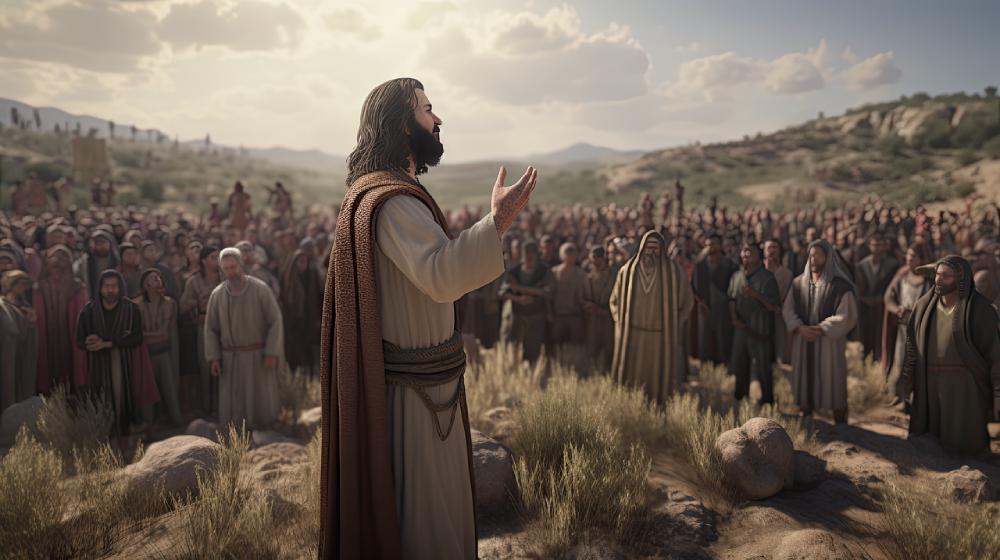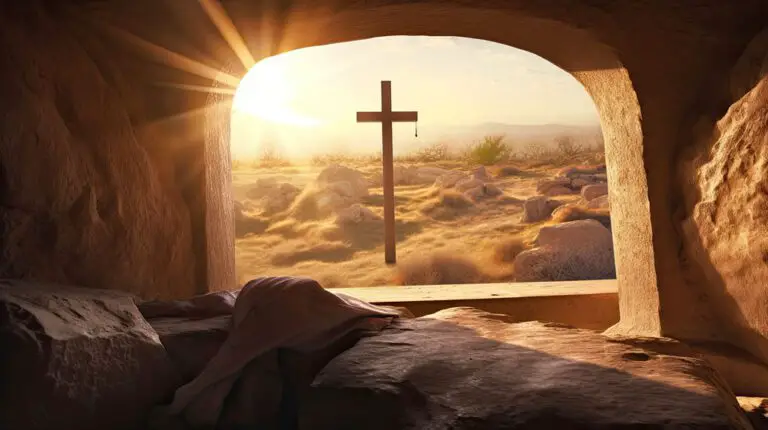As I sat in a Miami café some years ago, I noticed an elderly man at the corner table. He meticulously cut his breakfast into tiny pieces. The he ate slowly, deliberately, as if each bite might be his last. Something about him reminded me of my grandpa, who used to tell me stories about rationing bread during the Great Depression. “You never waste bread,” he’d say. “It’s life itself.”
That morning in Miami, I couldn’t shake the feeling that I was missing something profound about sustenance. Not just the kind that fills our stomachs, but the kind that fills our souls. Little did I know that this simple observation would lead me on a journey to understand one of the most powerful statements ever made.
“I am the bread of life,” Jesus declared.
We live in an age obsessed with extending life. Billionaires freeze their heads hoping science will resurrect them. Tech moguls dream of uploading consciousness to computers. Ancient explorers like Ponce de León searched Florida for the fountain of youth.
Yet they all missed the simple truth. Eternal life has been available all along. Not through science or exploration, but through a relationship with the one who calls himself the bread of life.
Key Takeaways
- Jesus Christ is the spiritual bread that satisfies our deepest hunger for meaning and eternal life.
- Like physical food nourishes our bodies, spiritual food from God’s Word nourishes our souls.
- The miracle of feeding 5,000 people with five loaves and two fish points to a greater spiritual truth.
- Many people seek Jesus for temporary benefits but miss the eternal sustenance He offers.
- True satisfaction comes not from material things but from believing in Jesus as our spiritual bread.
- Daily spiritual feeding through Scripture is essential for spiritual growth and strength.
The Context: More Than Physical Hunger

Thousands of people followed the Teacher across the Sea of Galilee. Not because they understood His message, but because He’d just performed an incredible miracle.
With only five loaves and two fish from a boy’s lunch, Jesus had fed over 15,000 people (5,000 men plus women and children). Everyone ate until they were satisfied and they gathered twelve baskets of leftovers.
But Jesus saw through their excitement. When the crowd found Him the next day, He cut straight to their real motivation:
“Truly, truly, I say to you, you are seeking me, not because you saw signs, but because you ate your fill of the loaves.” – John 6:26 (ESV)
These people weren’t spiritual seekers. They were freeloaders hoping for another free meal. Jesus knew their hearts. And He used this moment to teach one of the most important lessons about spiritual hunger.
He told them:
“Do not labor for the food that perishes, but for the food that endures to eternal life, which the Son of Man will give to you.” – John 6:27 (NKJV)
Two Types of Food: Natural and Spiritual Sustenance

Jesus introduced a revolutionary concept that day: the bread of life exists on two levels. Just as our physical bodies need daily food to survive, our spirits need daily spiritual nourishment.
Think about how natural food works. You eat breakfast, and by lunch you’re hungry again. You drink water, and hours later you’re thirsty. Physical food sustains us temporarily, but it always leaves us wanting more.
Spiritual food operates differently. When Jesus said,
“Whoever comes to me shall never hunger, and whoever believes in me shall never thirst.” – John 6:35 (ESV)
He wasn’t talking about our stomachs. He was addressing the deeper hunger that material things can never satisfy.
This spiritual hunger explains why people chase after wealth, fame, relationships, or experiences. Yet still feel empty inside.
They’re trying to fill a spiritual void with physical things. It’s like trying to satisfy physical hunger by looking at pictures of food—it simply doesn’t work.
How We Feed Spiritually
Here’s something fascinating: we eat spiritual food through our ears and ears. When we hear God’s Word, faith grows inside us. The Bible says,
“Faith comes by hearing, and hearing by the word of God.” – Romans 10:17 (NKJV)
Our spiritual taste buds become more refined as we mature. Seasoned believers can detect when something sounds “off” spiritually. Even when someone quotes Scripture.
They’ve developed discernment to distinguish between spiritual truth and spiritual junk food.
The Great “I AM” Declaration: Jesus as the Bread of Life

In one of the most profound statements in human history, Jesus declared:
“I am the bread of life.” – John 6:35 (NKJV)
This wasn’t just a nice metaphor. It was a divine declaration connecting Jesus to the eternal “I AM” who spoke to Moses from the burning bush.
When Moses asked God’s name, the response was simply “I AM WHO I AM” (Exodus 3:14).
Jesus used this same language: “I am the bread of life.” Not “I was” or “I will be,” but “I am”—present tense, eternal, unchanging.
The bread of life represents everything we need to survive spiritually. Bread was considered the staff of life in ancient cultures.
Jesus is our spiritual sustenance. Whoever comes to Him will never experience spiritual hunger again.
The Manna Connection: From Shadow to Reality

The crowd tried to impress Jesus by reminding Him of Israel’s history:
“Our fathers ate the manna in the wilderness; as it is written, ‘He gave them bread from heaven to eat’.” – John 6:31 (NKJV)
They were referring to the bread that fell heaven. Manna sustained the Israelites during their 40-year wilderness journey.
4 Then the Lord said to Moses, “Behold, I will rain bread from heaven for you. And the people shall go out and gather a certain quota every day, that I may test them, whether they will walk in My law or not. 5 And it shall be on the sixth day that they shall prepare what they bring in, and it shall be twice as much as they gather daily.” – Exodus 16:4-5 (KJV)
Every morning, this supernatural food appeared with the dew. The people called it manna, meaning “What is it?”
This manna was extraordinary. It was “angels’ food” and “bread of the mighty.” When ground up, it was like fresh oil—a symbol of the Holy Spirit throughout Scripture.
But Jesus said something stunning:
“Truly, truly, I say to you, it was not Moses who gave you the bread from heaven, but my Father gives you the true bread from heaven.” – John 6:32 (ESV)
The manna was just a preview—a shadow of something greater. While manna sustained life temporarily, Jesus offers something far superior:
“I am the living bread that came down from heaven. If anyone eats of this bread, he will live forever” – John 6:51 (ESV)
The difference is crucial:
“49Your fathers ate the manna in the wilderness, and they died. 50This is the bread that comes down from heaven, so that one may eat of it and not die.” – John 6:49-50 (ESV)
The Hard Teaching That Divided the Crowd
Jesus then said something that shocked everyone:
“53Truly, truly, I say to you, unless you eat the flesh of the Son of Man and drink his blood, you have no life in you. 54Whoever feeds on my flesh and drinks my blood has eternal life, and I will raise him up on the last day.” – John 6:53-54 (ESV)
The crowd was horrified. Many of His disciples said, “This is a hard saying; who can listen to it?” (John 6:60). The idea of eating flesh and drinking blood seemed like cannibalism to them.
But Jesus wasn’t backing down. He wasn’t trying to make His message more palatable or politically correct. He was testing their faith. Would they believe when they didn’t understand?
Many couldn’t handle it. The Bible records that “many of his disciples turned back and no longer walked with him” (John 6:66). They chose the exit door rather than trust Jesus with something beyond their comprehension.
The Spiritual Meaning Revealed
Jesus later explained what He meant:
“It is the Spirit who gives life; the flesh is no help at all. The words that I have spoken to you are spirit and life.” – John 6:63 (ESV)
Here’s the key: How did Jesus become flesh? Through the Word of God. When the angel announced Jesus’ birth to Mary, she believed God’s word and said, “Let it be to me according to your word” (Luke 1:38). According to John 1:14, “The Word became flesh.”
So when Jesus talked about eating His flesh, He was talking about receiving His words. When He mentioned drinking His blood, He was referring to receiving His life.
The words of Jesus are spirit and life. They’re the true bread from heaven.
Living by Every Word from God’s Mouth

This connects to an important principle from the Old Testament. In Deuteronomy 8:3 (ESV), Moses told the Israelites:
“He humbled you and let you hunger and fed you with manna, which you did not know, nor did your fathers know, that he might make you know that man does not live by bread alone, but man lives by every word that comes from the mouth of the Lord.”
When Satan tempted Jesus to turn stones into bread during His wilderness fast, Jesus quoted this exact passage:
“Man shall not live by bread alone, but by every word that comes from the mouth of God.” – Matthew 4:4 (ESV)
Jesus was acknowledging that while physical bread matters, spiritual bread matters more. Every day, we need fresh spiritual nourishment from heaven.
Just as the Israelites gathered manna daily, we need to feed on God’s Word regularly.
When we read Scripture or attend church the Spirit of God quickens our hearts. We receive strength that natural food could never provide—strength that endures forever.
Future Feast: The Hidden Manna
The story doesn’t end with this earthly life. In Revelation 2:17 (ESV), Jesus promises something incredible to those who overcome:
“To the one who conquers I will give some of the hidden manna.”
God has a secret stash of special spiritual food reserved for overcomers. This hidden manna will surpass anything we’ve experienced on earth. Along with we’ll get a white stone with a new, secret name that only the recipient knows.
Can you imagine tasting this hidden manna? It won’t satisfy temporarily like natural food. It will become part of your eternal being, providing nourishment throughout eternity.
We’ll also eat from the tree of life and drink from the river of life. We’ll fellowship personally with the Father, Son, and Holy Spirit, along with all the saints who’ve gone before us.
This isn’t just existing—this is truly living with eternal life as God Himself possesses it.
The Most Important Question

Throughout this teaching, Jesus repeatedly emphasized one crucial point: believing in Him. He said it many times because it’s the most important decision anyone can make.
“Truly, truly, I say to you, whoever believes has eternal life.” – John 6:47 (ESV)
This isn’t about intellectual understanding or having all your questions answered. It’s about choosing to trust Jesus even when you don’t comprehend everything. Faith is a choice to believe when understanding falls short.
The crowd wanted more signs and miracles before they’d believe. But Jesus was clear:
“This is the work of God, that you believe in him whom he has sent.” – John 6:29 (ESV)
Believing isn’t a small thing—it’s the big thing. It determines whether you experience eternal life or eternal separation from God.
5 Practical Steps for Daily Spiritual Nourishment
So how do we practically eat the bread of life? Here are some concrete ways:
1. Read Scripture Daily. Just as you wouldn’t skip meals for days, don’t skip feeding your spirit. Even a chapter a day provides essential spiritual nutrition.
2. Attend Church Regularly. Corporate worship and teaching provide spiritual food you can’t get alone. We need community to grow spiritually.
3. Pray Consistently: Prayer is both speaking to God and listening for His voice. It’s part of the spiritual feeding process.
4. Fellowship with Believers: Iron sharpens iron. Other Christians can help you discern spiritual truth from error.
5. Meditate on God’s Word: Don’t just read—chew on Scripture. Let it sink deep into your heart and mind.
Remember, your spirit is as real as your body. Neglecting physical food leads to weakness and death. Neglecting spiritual food leads to spiritual weakness and eventual spiritual death.
Conclusion
The bread of life isn’t just a beautiful metaphor. It’s the most practical truth you’ll ever encounter. Your spirit needs daily nourishment just as much as your body does.
The question isn’t whether you’re hungry. The question is what you’re trying to satisfy that hunger with.
Jesus stands ready to be your spiritual sustenance today and forever. Will you come to Him and never hunger again?
Frequently Asked Questions
Q. What does “bread of life” mean in the Bible?
A. The bread of life refers to Jesus Christ. His words are the spiritual sustenance that satisfies our deepest spiritual hunger. Just as physical bread nourishes our bodies, Jesus nourishes our souls and spirits.
Q. Why did Jesus call himself the bread of life?
A. Jesus used this metaphor because bread was the most basic, essential food for survival in ancient times. By calling himself the bread of life, Jesus was saying He is essential for spiritual survival and eternal life.
Q. What’s the difference between physical bread and spiritual bread?
A. Physical bread satisfies temporarily. You eat and get hungry again. Spiritual bread (Jesus) satisfies permanently. Those who come to Jesus never experience spiritual hunger again. He meets their deepest needs for meaning, purpose, and eternal life.
Q. How do we “eat” the bread of life?
A. We eat the bread of life by believing in Jesus Christ and receiving His words. Jesus is the Word made flesh. When we read Scripture, pray, and fellowship with Him, we’re feeding on the bread of life.
Q. What happened to the people who rejected Jesus’ teaching about the bread of life?
A. Many of Jesus’ disciples left Him when He taught about eating His flesh and drinking His blood. They couldn’t understand the spiritual meaning. They chose to walk away rather than trust Him with something beyond their comprehension.
Q. Is the bread of life available to everyone?
A. Yes, Jesus offers Himself as the bread of life to everyone. He said, “All that the Father gives me will come to me, and whoever comes to me I will never cast out” (John 6:37). Anyone can come to Jesus and receive eternal life.






